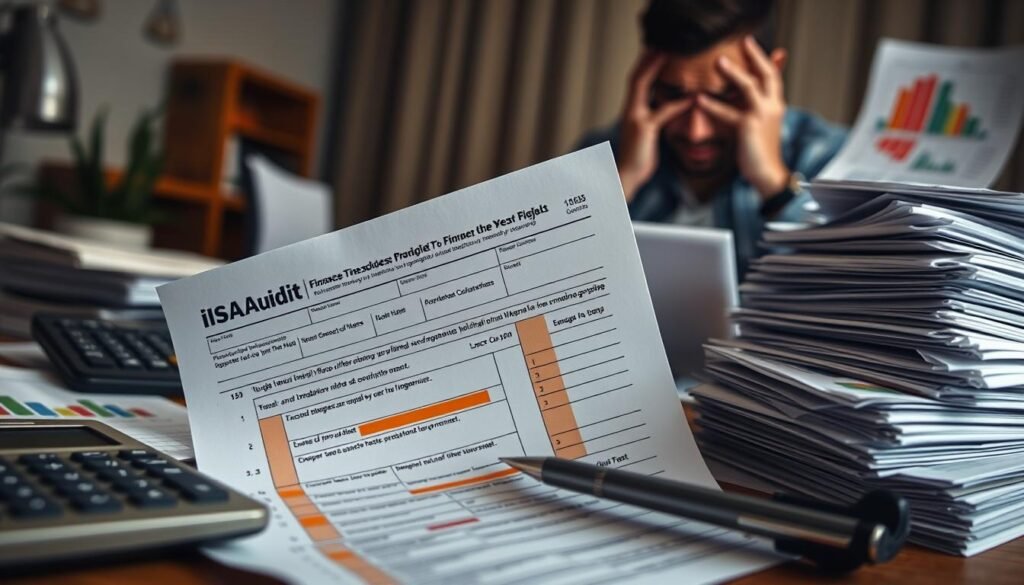Did you know the IRS picks a small number of tax returns for audit each year1? An IRS audit might seem scary, but being ready can make you feel strong. This guide will help you understand IRS audits. We’ll cover everything from the different types to how to solve them.
IRS audits can happen if your tax return has mistakes. Things like big business losses or not reporting income can raise red flags1. But, by getting your documents ready and checking your tax returns, you can feel better. Talking to tax experts can also help a lot.
The IRS usually has three years to start an audit after you file your taxes1. This can take nine to 18 months for businesses. With the right help, you can get through this and come out even stronger.
IRS audits can seem scary, but knowing the different types helps. An IRS audit checks your tax return and financial records. It makes sure you’ve given accurate information2.
An IRS audit is when the IRS looks at your tax return and financial records. They might pick your return for an audit for many reasons. This includes random selection, math mistakes, or if your return doesn’t match what employers or banks say3.
The IRS does different kinds of audits. Each one has its own way of working. Here are the three main types:
Knowing about these audit types helps you get ready. It makes sure you have all the documents and info you need23.
| Audit Type | Description | Percentage of Audits |
|---|---|---|
| Correspondence Audit | Conducted via mail, IRS requests additional information or documentation | Over 75%3 |
| Office Audit | Taxpayer must visit an IRS office to provide documentation | Less than 25%3 |
| Field Audit | IRS agent visits taxpayer’s home or business to review records | Less than 1%3 |
“The IRS can include returns filed within the last three years in an audit, with the possibility of adding additional years if a substantial error is identified. Generally, the IRS does not go back more than six years when conducting an audit.”2
By knowing about the different IRS audits, you can get ready better. This way, you’ll be more confident. You’ll have all the documents and info you need234.
The IRS audit process checks if your tax return is correct. It has IRS audit notification, examination stage, and resolution stage. Knowing this can help you feel more confident during an IRS audit.
The IRS starts with a written notice. It tells you which tax year(s) are being checked and what documents you need5. This notice is the first step, giving you time to get ready.
In the examination stage, an IRS auditor looks closely at your tax return and financial records5. They might ask for more info or clear up any questions. This stage can last from a few months to two years, based on how complex your case is.
After the examination, the IRS auditor shares their findings and suggestions6. This is the resolution stage. You can explain things, ask for a meeting, or try other ways to solve the issue5. If you still disagree, you can appeal within certain time limits.
| IRS Audit Process Stages | Key Highlights |
|---|---|
| Notification Stage | – IRS sends written notice detailing the tax year(s) being examined and required documentation5 |
| Examination Stage | – IRS auditor thoroughly reviews tax return and financial records5 – Auditor may request additional information or clarification5 – Examination stage can take several months to two years6 |
| Resolution Stage | – Auditor presents findings and recommendations6 – Taxpayer can provide explanations, seek a conference, or pursue alternative dispute resolution5 – Unresolved disagreements can lead to appeals within specific time frames5 |
Knowing the IRS audit process is key for taxpayers. Being ready and proactive helps you handle it well and get a fair outcome.
Getting ready for an IRS audit means collecting all your tax papers. You’ll need receipts, invoices, bank statements, and legal documents7. The IRS might ask for these to check your income, expenses, and tax credits7.
They also want loan documents to see if you can deduct certain things7. Your job papers, like uniform rules and W-2s, help prove your income7.
Looking over your tax returns is key to getting ready for an audit8. Find any mistakes or unclear parts that might cause trouble8. The IRS might ask for many records to check your tax return8.
By checking your tax returns, you show you’re serious about following the rules8.
About 70% of audits are by mail, and 30% are in person7. IRS audits usually focus on one part of your return and ask for about 10 records7. They might ask for medical records to check your expenses7.
They also want to know how you used loan money to see if you can deduct it7.
“The IRS frequently requests supporting documents like receipts, bills, and legal papers that detail the nature, amount, and purpose of transactions related to income, expenses, deductions, and credits claimed on the tax return.”
By getting your documents and reviewing your tax returns, you’re ready for the IRS audit78.
When you face an IRS audit, being ready for questions is key. By anticipating IRS audit questions, you can give clear answers backed by your documents. This shows you’re open and helps the audit go smoothly.
Knowing the IRS’s audit focus areas is important. They look at your income, deductions, and business expenses9. Knowing this helps you get ready for questions and calm any worries the examiner might have.
By understanding audit focus areas and getting ready for questions, you can feel more confident. Being organized, open, and quick to answer helps a lot during an audit.
“The best defense is a good offense. By anticipating IRS audit questions, you can take control of the situation and demonstrate your commitment to compliance.”

Also, remember that10 audits like financial statement and internal control audits help get ready for an IRS audit. They show your financial reports and controls are good, making the audit easier.
The9 IRS audit is a chance to show you’re serious about following the rules. By anticipating IRS audit questions, preparing for audit interviews, and understanding audit focus areas, you can face the audit with confidence. This helps keep your business or personal finances safe910.
Getting help from a tax expert is very important when you’re audited by the IRS. A tax attorney or a CPA can really help. They know a lot about tax laws and can guide you through the audit11.
Tax attorneys are special because they keep your talks private. This means you can share things without worrying about the IRS hearing about it11. They can talk to the IRS for you, help negotiate, and even defend you in court11.
CPAs are also very helpful. They know a lot about accounting and taxes. They can help you get ready for the audit, check your tax returns, and guess what questions the IRS might ask11. They know how the IRS works and can help you plan a good defense11.
It’s a good idea to get a tax professional as soon as you get an IRS audit letter11. They can make sure your rights are looked after and your interests are represented11.
“Navigating an IRS audit can be a daunting task, but with the help of a qualified tax professional, you can approach it with confidence and ensure a favorable outcome.”
If you’re being audited in Grand Rapids or Kalamazoo, CBH Attorneys & Counselors can help. They offer advice on how to get ready for the audit and defend yourself. Their knowledge and personal touch can really help protect your money during this tough time.
IRS audits can happen for many reasons. Knowing these reasons can help you avoid trouble. It makes dealing with audits easier.
Income that doesn’t match what third parties say can cause trouble. This includes W-2s, 1099s, and bank statements12. The IRS checks these closely because they might show you’re not reporting all income.
Big deductions and credits can catch the IRS’s eye13. If your deductions or credits seem too big, they might look into it. Claiming business losses too often can also raise questions.
The IRS is watching cryptocurrency closely because of fraud worries12. If you use cryptocurrency, make sure to report it right to avoid audits.
The IRS can audit you for up to three years, but longer if they find errors or fraud12. Keep your tax papers for at least three years, or up to six or seven years if you can12. If you don’t file taxes, the IRS can audit you forever12.

Knowing about these audit triggers helps you avoid problems. It makes your tax filings better and reduces audit risks.
The time it takes for an IRS audit can change a lot. It depends on many things14. For example, some audits take just a few months, while others can last years15.
The IRS can start an audit up to three years after you file your taxes14. They can even go up to six years if they find a big mistake in your taxes.
14 The time for a tax audit can be short or long. It can take weeks, months, or even years if there’s a big case15. More people are getting letters from the IRS asking for more information15.
14 If you answer quickly and correctly, a letter audit can be done in three to six months14. Office audits usually take a few hours and focus on a few issues15.
14 Letter audits usually take three to six months14. Office audits can take three to six months if you answer fast14. But, if you don’t give all the information, it can take longer14. Field audits can take about a year and check more than one year of taxes.
14 Small businesses might face longer audits because of more checks14. If you’re slow to respond, it can make the audit take longer.
| Audit Type | Typical Duration |
|---|---|
| Correspondence Audits | 3-6 months |
| Office Audits | 3-6 months |
| Field Audits | Approximately 1 year |
Maintaining patience and cooperation throughout the process can help facilitate a more efficient audit timeline.
“The duration of an IRS audit can vary significantly, depending on several factors such as the complexity of the tax return and the auditor’s workload.”
15 If you disagree with an audit, you can ask for more meetings, appeal, or go to court.
If you don’t agree with the IRS auditor, you have choices. You can ask for a meeting with the auditor’s boss. This is a chance to share your side and clear up any misunderstandings16.
If talking doesn’t solve the problem, you might try arbitration or mediation. These methods help find a solution by talking things through16.
If all else fails, you can appeal to the IRS Office of Appeals. They look at your case again, using tax laws to decide16. Getting help from a tax expert is smart to make sure your rights are looked after.